
Networking and increased participation are the unsung successes of the changes made during the coronavirus pandemic, particularly for women on the left. Political networking has always been difficult for women because it requires so much in-person effort and more often than not has been London-centric, excluding people with caring responsibilities and anyone with an inability to travel, due to finances, medical issues or other circumstances.
There is no doubt our movement has been all the poorer for it: we have missed out on the voices, expertise and experiences of countless people – but particularly of women, who take on most of the caring responsibilities in our communities. Somewhat ironically, the pandemic and subsequent lockdowns have brought a change to this situation, as video conference technology has meant previous factors preventing attendance do not apply.
In parliament, new networks – such as the Labour Women’s Parliamentary Staff Network – have been created to give women support while working from home, which can be isolating and lonely. It’s enabling more people to keep in touch across the country, including those from constituency offices, providing online training events, safe spaces for conversations about anything and everything and a chance to hear from speakers in academia, politics, the voluntary sector and the media. It has also provided an opportunity for quality discussion, debate and thinking with more diverse groups of women than ever before. This must be harnessed as we continue to make strides forward to increase participation and equality for women throughout the labour movement.
On almost any day of the week, there is an organisation putting on an event that requires a few clicks on a computer or phone for people to take part from their homes, often (as women regularly do) while multitasking; washing up, writing, wrapping presents, feeding a baby or cooking – the list goes on. It’s been liberating for many organisations to be able to run multiple events weekly with the cost of events previously leaving them running only a handful each year.
Organisers are thinking differently about what they can deliver and how, and they are collaborating more easily with other networks to reach more people. This is better for participation and for democracy. The Fabian Women’s Network, for example, is currently organising events to celebrate and remember important women in our party’s history like Barbara Castle and Mo Mowlam, has started a book club and run events on building resilience for activists and on countless issues impacting women.
What is also evident throughout the women’s movement is that – as geographical barriers to communication have fallen away, and virtual communication methods have taken over – women are supporting, mentoring and counselling each other on being productive activists, campaigning and generally staying sane. Women are stepping up everywhere to lift each other up, help each other out and even reaching across political party lines to support one another in navigating familiar and unfamiliar challenges.
For many of us, advice and support is now readily available from our WhatsApp groups and regular phone or Zoom calls, with some of our most productive and supportive conversations in the political sphere now coming from people we have never met in person, but instead are associations made in online forums. Finding people you have things in common with is one of the great joys in life. Political activism is incredibly rewarding but it can be hard, and finding people who have endured the same struggles is vital for wellbeing.
The sisterhood has adapted to stay connected in what has been an unforgettable year, and is very much alive and well. We now need to make sure this new way of connecting and working together is sustained after the coronavirus restrictions have ended. This is important not just for networks but in other places where decisions are made, including council chambers and party meetings. It would be a tragedy if, once normal travel resumes, all those women who are now more involved in the labour movement than ever before are once again excluded from meetings and events being in person only.
The way people are participating has changed and so must we as we look to the future post-coronavirus. In her appearance on Desert Island Discs, Mo Mowlam said women were “central to the process working” in Northern Ireland. Women have been and remain central to countless successes in our movement. Long may this continue.




More from LabourList
‘I spent years telling workers the law couldn’t help them – that has changed’
Josh Simons resigns as Cabinet Office minister amid investigation
‘After years of cuts, Labour’s local government settlement begins to put things right’